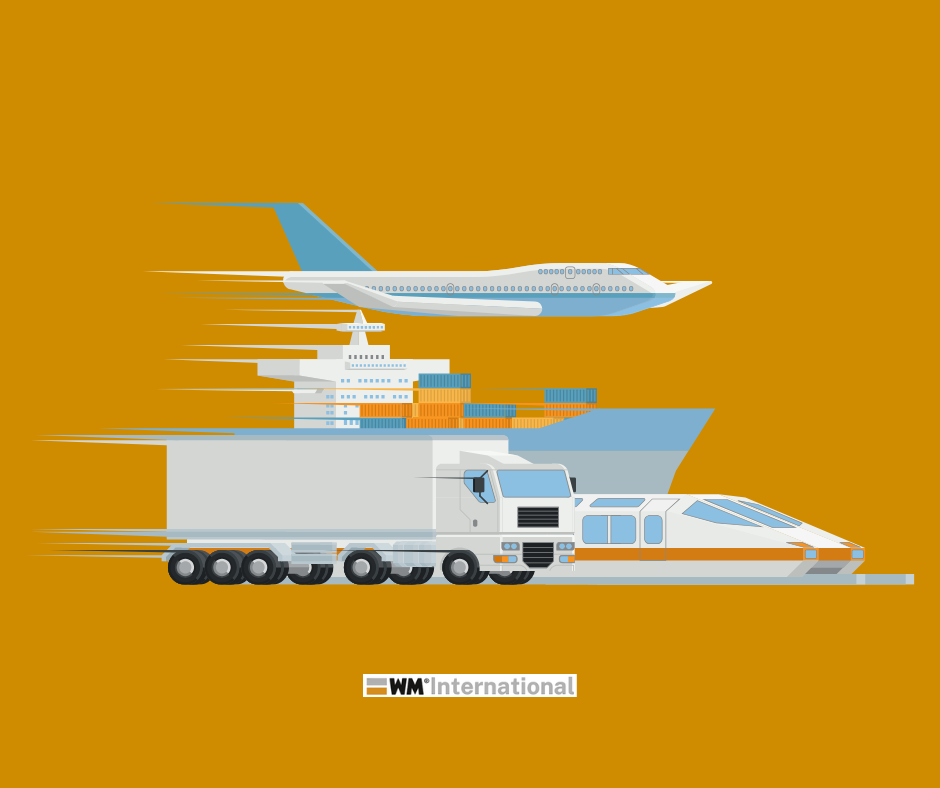Introduction - Why International Transportation Matters More Than Ever
In today's world of increasingly globalised commerce, international transportation plays a critical role in the movement of goods, enabling businesses to expand their reach and serve customers across borders. Whether it's transporting raw materials, consumer products, or machinery, international transportation ensures supply chains remain operational and competitive. This guide explores the core components of international transportation, challenges faced by global shippers, and strategic solutions to optimise global logistics.
What is International Transportation?
International transportation refers to the process of moving goods between countries via different modes, including sea, air, rail, and road. It is an essential part of global trade, connecting producers with consumers and facilitating commerce worldwide. Each mode comes with unique benefits, costs, and suitability based on cargo type, delivery timeframes, and destination.
Key functions of international transportation include:
- Cross-border movement of goods
- Freight forwarding and logistics coordination
- Customs clearance and regulatory compliance
- Packaging and handling for long-distance transit
Understanding these functions is essential for businesses looking to thrive in the global marketplace.
Main Modes of International Transportation
To begin with, each transportation method offers distinct advantages. Selecting the right one depends on factors like cost, speed, cargo type, and environmental impact.
- Ideal for bulk shipments and heavy goods
- Most cost-effective for long-distance trade
- Can handle a wide range of cargo, including FCL (Full Container Load) and LCL (Less than Container Load)
- Slower than air transport but highly economical
- Fastest mode for international deliveries
- Preferred for perishable, high-value, or time-sensitive items
- Higher costs but ensures speed and reliability
- Requires detailed documentation and tight customs procedures
Road Freight
- Offers flexibility and door-to-door delivery
- Often used for short-haul or regional cross-border shipments
- Suitable for consolidated loads and palletised goods
Rail Freight
- Cost-effective and environmentally friendly for long-distance inland transport
- Reliable schedules and less affected by weather disruptions
- Suitable for large volumes and heavy cargo, especially across Europe and Asia
- Freight Forwarding and Logistics Coordination
Freight forwarders are crucial facilitators in international transportation. They act as intermediaries between shippers and carriers, managing all aspects of the logistics chain, from documentation to delivery.
Services typically include:
- Booking cargo space with carriers
- Consolidating and deconsolidating shipments
- Managing customs clearance
- Ensuring insurance coverage
- Tracking and reporting on shipment status
Partnering with an experienced freight forwarder simplifies complex global operations, reduces risk, and improves overall efficiency.
Warehousing: The Backbone of International Supply Chains
Warehousing plays a central role in ensuring goods are safely stored, sorted, and dispatched efficiently. Effective warehousing supports international transportation by bridging the gap between production and distribution.
Our Warehousing Services We provide secure, strategically located warehousing facilities equipped with modern inventory systems. Services include:
- Storage and stock management
- Order fulfilment and dispatch
- Kitting, packaging, and labelling
- Real-time inventory tracking
By leveraging warehousing, businesses can reduce lead times, manage seasonal demand, and optimise distribution strategies.
Challenges in International Transportation and How to Overcome Them
However, despite the many benefits, international transportation comes with its own set of challenges. Moreover, companies must continuously adapt to changing regulations, advancing technologies, and unpredictable global disruptions to maintain smooth operations. Therefore, businesses face a variety of logistical, regulatory, and financial hurdles that require careful management.
Customs and Regulatory Compliance
Firstly, varying import and export laws, along with complex documentation requirements, pose significant challenges. Consequently, potential delays often arise due to non-compliance or inspections. Hence, accurate tariff classification and valuation are critical to avoid costly setbacks.
Rising Transportation Costs
Additionally, rising costs are a major concern. Fuel price volatility and fluctuating freight rates directly impact overall expenses. Furthermore, tariffs, taxes, and various surcharges in international trade can further increase costs. To mitigate these, companies should focus on strategies such as contract negotiation, route optimisation, and freight consolidation.
Supply Chain Disruptions
Moreover, global crises, such as pandemics, geopolitical tensions, and natural disasters, can cause severe supply chain disruptions. Therefore, having robust contingency plans and diversifying supply chains is essential to maintain continuity and resilience.
Technology’s Impact on International Transportation
As a result, technology is playing a transformative role in global logistics by boosting efficiency, enhancing visibility, and enabling automation within international transportation systems.
Real-Time Tracking and Telematics
For example, GPS tracking of vehicles and containers allows for live updates accessible to stakeholders and customers alike, improving transparency throughout the shipping process.
Automation and Digital Documentation
In addition, the adoption of electronic Bills of Lading (eB/L) and online customs declarations facilitates faster, more accurate automated clearance procedures, reducing paperwork and human error.
Data Analytics and AI
Furthermore, predictive analytics powered by AI aids in demand forecasting and route optimisation, which ultimately reduces delivery times and lowers costs.
Blockchain in Logistics
Finally, blockchain technology enhances transparency and security in shipment records, helping to prevent fraud and minimise paperwork.
The Importance of Sustainable International Transportation
As climate change becomes a growing concern, sustainability is a top priority in global logistics. International transportation contributes significantly to global emissions, prompting companies to adopt greener practices.
Green Logistics Strategies:
- Use of biofuels and electric vehicles
- Shifting to rail or sea instead of air, where possible
- Carbon offsetting initiatives
- Eco-friendly packaging
Regulatory bodies are also pushing for emission reductions, making sustainability not just a corporate responsibility but also a compliance necessity.
Trends Shaping the Future of International Transportation
Firstly, staying ahead of emerging global logistics trends is essential for businesses aiming to remain competitive and resilient in an ever-evolving market. Notably, several key trends are shaping the future of international transportation.
Digital Freight Platforms
Moreover, marketplace-style digital freight platforms are revolutionising the industry by offering transparent pricing and seamless booking processes. These platforms enable businesses to compare options quickly and make informed decisions.
AI-Powered Predictive Logistics
In addition, artificial intelligence (AI) is playing an increasingly vital role by optimising inventory management, delivery schedules, and transport modes. Consequently, companies benefit from improved efficiency and reduced costs.
Last-Mile Innovations
Furthermore, innovations in last-mile delivery, such as the use of drones and electric delivery vehicles, are transforming urban logistics. These technologies help reduce delivery times and carbon emissions, enhancing sustainability.
Trade Agreements and Policy Changes
Lastly, evolving trade agreements and policy changes continue to influence transportation networks globally. Therefore, businesses must stay well-informed and agile to avoid potential disruptions and capitalise on new opportunities.
Our Services to Power Your Global Logistics
At the same time, we offer comprehensive, end-to-end international transportation services designed to streamline your supply chain and enhance operational efficiency.
Road Freight
For instance, our road freight solutions are customised to meet diverse delivery needs across Europe and neighbouring regions. With scheduled services, modern vehicles, and expert drivers, we consistently guarantee punctual and secure deliveries.
Warehousing
Similarly, our warehousing services provide optimal storage and fulfilment capabilities. Whether managing palletised goods or specialised handling, we support your business with tailored inventory solutions and seamless integration into your broader logistics network.
Rail Freight
Additionally, our rail freight services are ideal for transporting large volumes in an environmentally conscious manner. We efficiently connect major industrial hubs and expertly manage intermodal transitions, ensuring reliable and cost-effective deliveries.
Frequently Asked Questions (FAQs)
Q1: What is the best mode of international transportation for my business?
A1: The best mode largely depends on your cargo type, delivery timeline, and budget. For urgent shipments, air freight is most suitable. Conversely, sea freight offers cost-efficiency for less time-sensitive cargo. Road and rail freight are perfect choices for regional or landlocked destinations.
Q2: How do I ensure my goods comply with international regulations?
A2: Working closely with experienced freight forwarders is crucial. Moreover, staying updated on the import/export rules of each country and ensuring accurate documentation and clear labelling greatly reduce compliance risks.
Q3: Can I track my international shipment in real time?
A3: Yes, most carriers now offer GPS-enabled tracking. Through freight portals or mobile apps, you can receive real-time updates, which enhances transparency and boosts customer confidence.
Q4: How can I reduce the carbon footprint of my international logistics?
A4: To reduce your environmental impact, opt for eco-friendly transportation modes, consolidate shipments where possible, use sustainable packaging, and invest in carbon offsetting programmes.
Conclusion: Navigating the World with Confidence
In conclusion, international transportation remains a cornerstone of global commerce, enabling businesses to operate efficiently across borders. By understanding the available modes, tackling common challenges, and leveraging the latest technologies alongside sustainable practices, companies can significantly streamline their logistics and broaden their global reach.
Whether you are new to global trade or seeking to optimise your existing logistics strategy, our expert team is here to assist. Explore our road freight, warehousing, and rail freight services today to unlock the full potential of international transportation.




